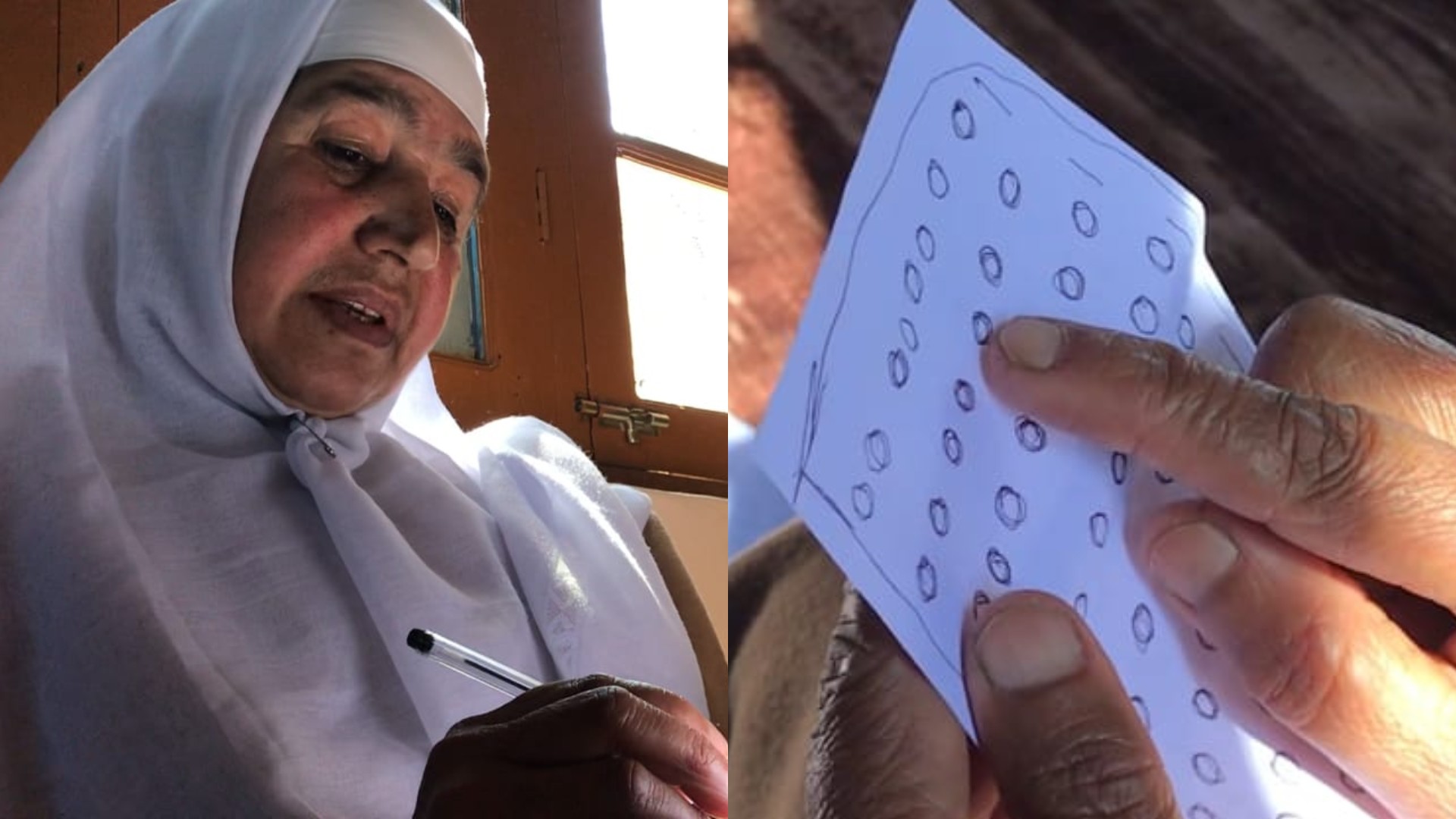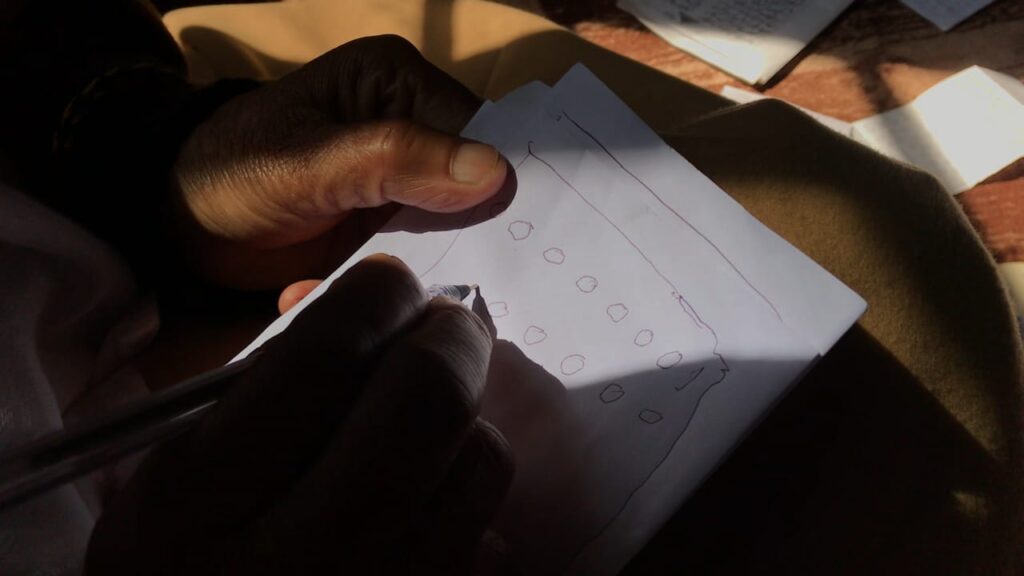Bandipora District, JAMMU & KASHMIR:

Zareefa Jan has created a “language of circles” to help her document her poems. Only she can decode them.
Zareefa Jan handed me a piece of paper on which several circles were scribbled in pencil. It was only on closer look that I could make out the small differences between them – some were larger, some were not as perfectly circular, some were closer to each other, some seemed circled over and over again. They were laid out neatly in a line. As I continued trying to decipher them, she fished out a pencil and added some lines of circles on a fresh piece of slightly crumpled paper – writing from right to left, the way Urdu and Kashmiri scripts are written.
“Nobody in the world can read those lines except my mother,” Shafaat Lone, Zareefa’s son, told VICE.
Those “lines” are actually Zareefa’s very own coded language, one that she has developed as a means to archive her poetry.

The 65-year-old sufi poetess living in north Kashmir’s Bandipora district in India never went to school. And so, even though she can speak her native Kashmiri language, she can’t read or write in it.
Sufism is a mystical form of Islam, an unorthodox school of practice that focuses more on the esoteric aspects of religious life, and in which Sufis strive for direct, personal experiences with God.
“This is my language, the language of circles,” she tells me proudly. “I’ve developed it over the years.”
Zareefa’s initiation into poetry started a few years after she got married, when she was in her late thirties. She had gone to fetch water from a nearby brook, when she claims she lost all sense of the world around her and fell into a kind of a trance. When she came to, she’d lost her pitcher, but also felt like a different person altogether.
“When I regained my senses, a gazal just came out of my mouth,” she said.
A “gazal” is a poem or an ode that originated in Arabic poetry, and often has to do with themes like love, longing and loss. “Until then, I had no idea of what poetry was because I had never read it. But ever since, I have written hundreds of poems and gazals.”
She read out a few lines from one of her poems:
“Panie soaraan aam yawuniyey
Lalwuniyey thovtham naar.
Yawun myon chambi dulwuniyey
Yi chu samsara napaidaar.
(I didn’t destroy my youth as a fire kept nourishing me. My youth is insubstantial in the transient world.)”

When Zareefa realised that she had a penchant for poetry, her children were in school. They were learning how to read and write in English and Urdu. But her poems would come to her in Kashmiri – a neglected language whose use is declining, even in Kashmir.
“It would have been futile and unjust to ask them to learn another language. And who would have taught them? Kashmiri, as a subject, was not part of their school curriculum like English and Urdu,” she said. “Also, I wasn’t sure whether to share my poetry with them at all.”
It took her a few years to muster the courage to tell, first, her husband, and then her children, about her poems. To her surprise, they were amazed at the content of the poems. However, she could memorise and remember only a few of her works; most were lost to memory since she had no way of documenting them.
Initially, Shafaat tried to record them on tape. Then, her elder daughter, Kulsum, tried to write them down with the little Kashmiri she knew. But Zareefa was unhappy with both ways of archiving.

“I can’t take my children with me everywhere I go to read my poetry and ask them to whisper my own lines into my ear so that I can say them out loud for others,” she said. “Also, my children can’t be with me every time I have a thought and want to record it, either on tape or on paper.”
So, she devised another technique.
Whenever she had a thought, she’d grab a page and draw different shapes of things on it. Most of it would be literal. “If there was an apple as a word in my poem, I’d draw an apple; if there was a heart, I’d draw a heart,” she said.
Later, whenever her daughter had the time, Zareefa would decode those shapes and Kulsum would write down the poem in conventional script.
“But I am illiterate, and I had never held a pen before,” said Zareefa. “So everything I drew was just a different shape and size of a circle. Like, even if I drew a banana, it would be circular!”
Still, those odd, circular shapes proved to be a good cue for her to remember her lines until her daughter could note them down. That, however, came to a stop three years ago, with Kulsum’s sudden passing.
In grief, Zareefa neglected to document her poems for a time, until she decided to revisit those circular shapes.

She realised that the many years of assigning her own meaning to her circles meant she had created an alphabet of sorts. Only she could read it, but she was content with that. It’s not even a fixed lexicon where one shape always stands in for a particular meaning. It keeps evolving as she gives the circles meaning that only she can remember and decode.
Now, those pages filled with squiggly circles lie inside books that hold them together, a repository of some 300 poems she has thus written. Her family is trying to get them all published in both her coded scripture and its conventional transliteration side by side.

Some experts believe that Zareefa could well be the first poet in the world to have created her own alphabet to preserve her creations.
“As a student and teacher of poetry, I haven’t seen this kind of thing anywhere in the world of poetry,” said Seraj Ansari, an Urdu teacher. “If what she is saying is true, then she is probably the first poet in the world to do so.”
However, Zareefa’s son tells me how some people doubt his mother’s claim that her circles carry meaning that only she can decode. They suspect that she really remembers her poetry and only pretends to read it from her circles.
But one of the oldest and most revered sufi poets in Kashmir, Ab Kareem Parwana, believes Zareefa.
“No poet in the world can remember everything they have written,” he told VICE. “I have not seen or heard of anyone in my lifetime saying they remember their entire poetry collection. She is a mystic poet, and in mysticism, everything is possible.”
Follow Rouf Fida on Twitter.
source: http://www.vice.com / Vice / Home> Life / by Rouf Fida / Photos by Rouf Fida / August 06th, 2021








